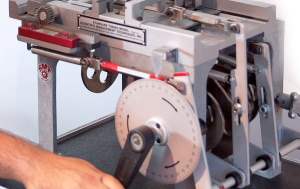I’m used to thinking of assessments as being paper and pencil exercises — or the online equivalent. A more modern type of assessment is an online game or simulation; and these are indeed useful tools for measuring traits and abilities.

However, it only makes sense that an assessment for mechanical skills would involve hardware rather than paper or computers. I got a huge kick out of the Optitest assessment for mechanical skills, in part because it is so different from what we usually think of as an assessment test, and in part because the value is so self-evident. It’s easy to imagine someone who is great at fixing machines, but a disaster at any kind of paper and pencil test — so to test that person you want to put them in front of hardware.
The assessment is quite straightforward. The person is shown how a machine works, then sent out of the room while the assessor disables the machine in one way or another. The person then has to fix the machine and is judged on the speed of repair and the logic of their approach.
What is interesting?
- Most HR people live in a world of paper and computers, it’s interesting to see an assessment designed for people who spend their days with machines.
What is really important?
- What matters is the dispersion of mechanical abilities amongst applicants (i.e. how much difference does it make to weed out poorer performers or to distinguish good from great?) If the dispersion is great then an accurate assessment has a lot of value.
- My suspicion is that the dispersion of ability is high and that mechanical assessments of ability will be effective. It would be easy enough to get empirical data by experimenting with the test and I’d certainly be interested in seeing how that turns out. If someone has such data, let me know at dcreelman@creelmanresearch.com.
